关于哈姆雷特
- 格式:doc
- 大小:114.00 KB
- 文档页数:20

《哈姆雷特》对人性的探讨《哈姆雷特》是莎士比亚的经典悲剧之一,该剧围绕主人公哈姆雷特展开,深入探讨了人性的复杂性和人类行为的多重层面。
通过对人性的揭示,莎士比亚使读者思考生命的意义、内心的矛盾与挣扎以及道德伦理的困境。
本文将从个体和社会两个方面阐述《哈姆雷特》对人性的探讨。
一、个体层面《哈姆雷特》通过哈姆雷特这个复杂的人物形象,深入揭示了人性的矛盾与复杂性。
哈姆雷特因为父亲的死去而沉浸在内心的痛苦中,在复仇的任务中,他陷入了选择与犹豫的困境之中。
他思考自己的存在,质疑生命的意义以及死亡的真相,这反映了人性探索的常见主题。
哈姆雷特的内心矛盾和挣扎,使读者深入思考人性的复杂性和人类情感的不可预测性。
二、社会层面《哈姆雷特》还通过剧中角色之间的互动,呈现了社会中人性的各种表现。
例如,克劳迪斯作为反面形象,代表了道德沦丧和权力欲望的黑暗一面。
他为了个人的私利,不惜欺骗和背叛他人,将社会推向混乱。
与之相对的,哈姆雷特父亲的幽灵则代表了正义与真相的力量。
这些角色的对比与冲突,揭示了社会中人性善恶两面性的复杂性。
三、人性困境与道德伦理在《哈姆雷特》中,莎士比亚探讨了人性困境与道德伦理的问题。
哈姆雷特在复仇的过程中,内心受到了道德伦理的挑战。
他面临着是否应该杀死克劳迪斯的艰难选择。
通过哈姆雷特的思辨和内心的矛盾,莎士比亚引发了关于正义、道德和复仇的深入思考。
这也引发了读者对道德、良知和自我认同的思考,从而揭示了人类面对复杂的道德选择时所面临的困境。
四、人性的阴暗面与悔恨《哈姆雷特》中,人性的阴暗面得到了充分的揭示。
哈姆雷特充满了怨恨和悔恨,他对自己未能及时行动感到内疚。
这种内心的痛苦和自责是人性中普遍存在的一部分。
莎士比亚通过描绘哈姆雷特的悔恨,使读者意识到人性中的弱点和错误,并激发了对自我改变和反思的欲望。
结论综上所述,《哈姆雷特》是一部深刻揭示人性复杂性的作品,它通过哈姆雷特的形象、角色之间的互动以及道德伦理的讨论,全面地探索了人性的多面性。
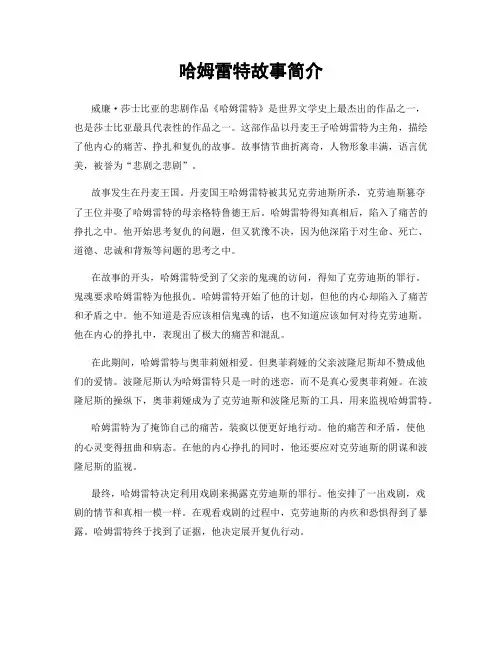
哈姆雷特故事简介威廉·莎士比亚的悲剧作品《哈姆雷特》是世界文学史上最杰出的作品之一,也是莎士比亚最具代表性的作品之一。
这部作品以丹麦王子哈姆雷特为主角,描绘了他内心的痛苦、挣扎和复仇的故事。
故事情节曲折离奇,人物形象丰满,语言优美,被誉为“悲剧之悲剧”。
故事发生在丹麦王国。
丹麦国王哈姆雷特被其兄克劳迪斯所杀,克劳迪斯篡夺了王位并娶了哈姆雷特的母亲格特鲁德王后。
哈姆雷特得知真相后,陷入了痛苦的挣扎之中。
他开始思考复仇的问题,但又犹豫不决,因为他深陷于对生命、死亡、道德、忠诚和背叛等问题的思考之中。
在故事的开头,哈姆雷特受到了父亲的鬼魂的访问,得知了克劳迪斯的罪行。
鬼魂要求哈姆雷特为他报仇。
哈姆雷特开始了他的计划,但他的内心却陷入了痛苦和矛盾之中。
他不知道是否应该相信鬼魂的话,也不知道应该如何对待克劳迪斯。
他在内心的挣扎中,表现出了极大的痛苦和混乱。
在此期间,哈姆雷特与奥菲莉娅相爱。
但奥菲莉娅的父亲波隆尼斯却不赞成他们的爱情。
波隆尼斯认为哈姆雷特只是一时的迷恋,而不是真心爱奥菲莉娅。
在波隆尼斯的操纵下,奥菲莉娅成为了克劳迪斯和波隆尼斯的工具,用来监视哈姆雷特。
哈姆雷特为了掩饰自己的痛苦,装疯以便更好地行动。
他的痛苦和矛盾,使他的心灵变得扭曲和病态。
在他的内心挣扎的同时,他还要应对克劳迪斯的阴谋和波隆尼斯的监视。
最终,哈姆雷特决定利用戏剧来揭露克劳迪斯的罪行。
他安排了一出戏剧,戏剧的情节和真相一模一样。
在观看戏剧的过程中,克劳迪斯的内疚和恐惧得到了暴露。
哈姆雷特终于找到了证据,他决定展开复仇行动。
在复仇的过程中,哈姆雷特不慎杀死了波隆尼斯,这使得他的处境更加危险。
克劳迪斯趁机下令将哈姆雷特送往英国,并密谋将他处死。
但哈姆雷特幸运地逃脱了死亡的险境,并返回丹麦。
最终,哈姆雷特和克劳迪斯展开了一场决斗。
在决斗中,哈姆雷特被毒剑刺伤,同时克劳迪斯也被毒酒所害。
在临死前,哈姆雷特赶走了毒剑,并用剩下的力气将克劳迪斯杀死。
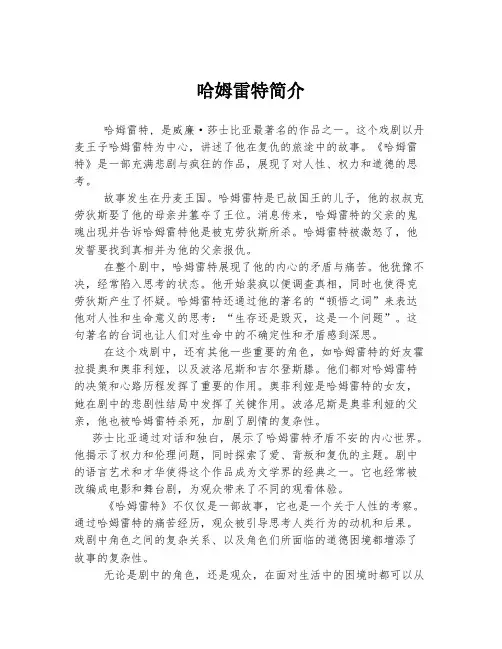
哈姆雷特简介哈姆雷特, 是威廉·莎士比亚最著名的作品之一。
这个戏剧以丹麦王子哈姆雷特为中心,讲述了他在复仇的旅途中的故事。
《哈姆雷特》是一部充满悲剧与疯狂的作品,展现了对人性、权力和道德的思考。
故事发生在丹麦王国。
哈姆雷特是已故国王的儿子,他的叔叔克劳狄斯娶了他的母亲并篡夺了王位。
消息传来,哈姆雷特的父亲的鬼魂出现并告诉哈姆雷特他是被克劳狄斯所杀。
哈姆雷特被激怒了,他发誓要找到真相并为他的父亲报仇。
在整个剧中,哈姆雷特展现了他的内心的矛盾与痛苦。
他犹豫不决,经常陷入思考的状态。
他开始装疯以便调查真相,同时也使得克劳狄斯产生了怀疑。
哈姆雷特还通过他的著名的“顿悟之词”来表达他对人性和生命意义的思考:“生存还是毁灭,这是一个问题”。
这句著名的台词也让人们对生命中的不确定性和矛盾感到深思。
在这个戏剧中,还有其他一些重要的角色,如哈姆雷特的好友霍拉提奥和奥菲利娅,以及波洛尼斯和吉尔登斯滕。
他们都对哈姆雷特的决策和心路历程发挥了重要的作用。
奥菲利娅是哈姆雷特的女友,她在剧中的悲剧性结局中发挥了关键作用。
波洛尼斯是奥菲利娅的父亲,他也被哈姆雷特杀死,加剧了剧情的复杂性。
莎士比亚通过对话和独白,展示了哈姆雷特矛盾不安的内心世界。
他揭示了权力和伦理问题,同时探索了爱、背叛和复仇的主题。
剧中的语言艺术和才华使得这个作品成为文学界的经典之一。
它也经常被改编成电影和舞台剧,为观众带来了不同的观看体验。
《哈姆雷特》不仅仅是一部故事,它也是一个关于人性的考察。
通过哈姆雷特的痛苦经历,观众被引导思考人类行为的动机和后果。
戏剧中角色之间的复杂关系、以及角色们所面临的道德困境都增添了故事的复杂性。
无论是剧中的角色,还是观众,在面对生活中的困境时都可以从《哈姆雷特》中得到启示。
这部戏剧不仅给予读者和观众带来的是娱乐,还提供了对生命和人性的深刻思考。
总之,《哈姆雷特》是一部充满疯狂与悲剧色彩的戏剧作品。
它通过揭示人性的复杂性和内心世界的冲突,引发观众的思考。
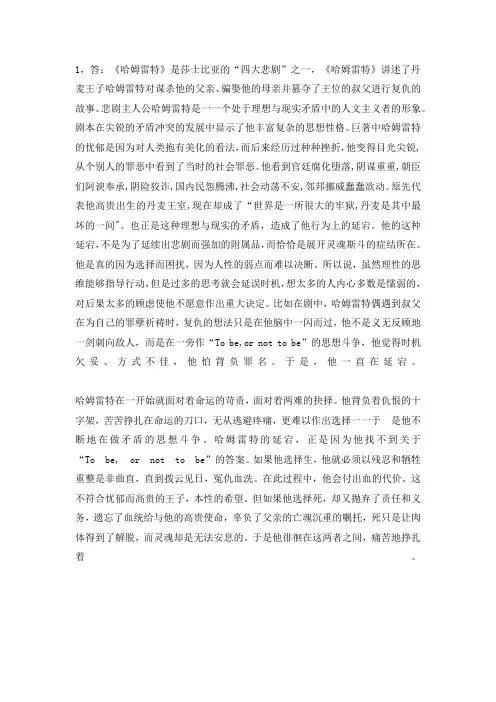
1,答:《哈姆雷特》是莎士比亚的“四大悲剧”之一,《哈姆雷特》讲述了丹麦王子哈姆雷特对谋杀他的父亲、骗娶他的母亲并篡夺了王位的叔父进行复仇的故事。
悲剧主人公哈姆雷特是一一个处于理想与现实矛盾中的人文主义者的形象。
剧本在尖锐的矛盾冲突的发展中显示了他丰富复杂的思想性格。
巨著中哈姆雷特的忧郁是因为对人类抱有美化的看法,而后来经历过种种挫折,他变得目光尖锐,从个别人的罪恶中看到了当时的社会罪恶。
他看到官廷腐化堕落,阴谋重重,朝臣们阿谀奉承,阴险狡诈,国内民怨腾沸,社会动荡不安,邻邦挪威蠢蠢欲动。
原先代表他高贵出生的丹麦王室,现在却成了“世界是一所很大的牢狱,丹麦是其中最坏的一间"。
也正是这种理想与现实的矛盾,造成了他行为上的延宕。
他的这种延宕,不是为了延续出悲剧而强加的附属品,而恰恰是展开灵魂斯斗的症结所在。
他是真的因为选择而困扰,因为人性的弱点而难以决断。
所以说,虽然理性的思维能够指导行动,但是过多的思考就会延误时机,想太多的人内心多数是懦弱的,对后果太多的顾虑使他不愿意作出重大诀定。
比如在剧中,哈姆雷特偶遇到叔父在为自己的罪孽祈祷时,复仇的想法只是在他脑中一闪而过,他不是义无反顾地一剑刺向敌人,而是在一旁作“To be,or not to be”的思想斗争,他觉得时机欠妥、方式不佳,他怕背负罪名。
于是,他一直在延宕。
哈姆雷特在一开始就面对着命运的苛责,面对着两难的抉择。
他背负着仇恨的十字架,苦苦挣扎在命运的刀口,无从逃避疼痛,更难以作出选择一一于是他不断地在做矛盾的思想斗争。
哈姆雷特的延宕,正是因为他找不到关于“To be, or not to be”的答案。
如果他选择生,他就必须以残忍和牺牲重整是非曲直,直到拨云见日,冤仇血洗。
在此过程中,他会付出血的代价。
这不符合忧郁而高贵的王子,本性的希望。
但如果他选择死,却又抛弃了责任和义务,遗忘了血统给与他的高贵使命,辜负了父亲的亡魂沉重的嘱托,死只是让肉体得到了解脱,而灵魂却是无法安息的。
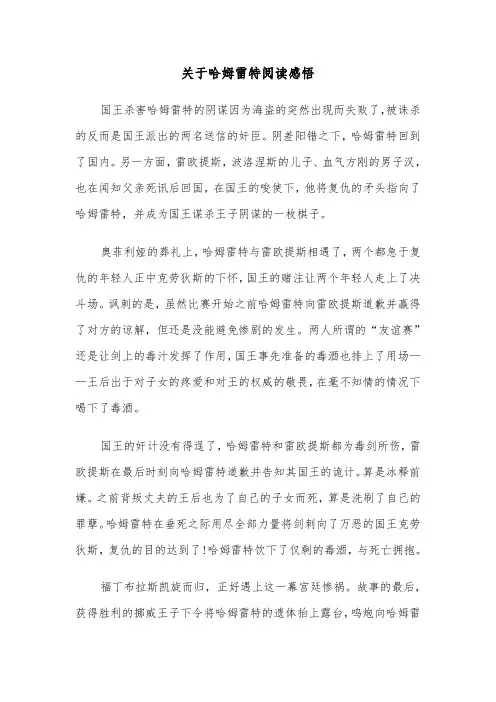
关于哈姆雷特阅读感悟国王杀害哈姆雷特的阴谋因为海盗的突然出现而失败了,被诛杀的反而是国王派出的两名送信的奸臣。
阴差阳错之下,哈姆雷特回到了国内。
另一方面,雷欧提斯,波洛涅斯的儿子、血气方刚的男子汉,也在闻知父亲死讯后回国,在国王的唆使下,他将复仇的矛头指向了哈姆雷特,并成为国王谋杀王子阴谋的一枚棋子。
奥菲利娅的葬礼上,哈姆雷特与雷欧提斯相遇了,两个都急于复仇的年轻人正中克劳狄斯的下怀,国王的赌注让两个年轻人走上了决斗场。
讽刺的是,虽然比赛开始之前哈姆雷特向雷欧提斯道歉并赢得了对方的谅解,但还是没能避免惨剧的发生。
两人所谓的“友谊赛”还是让剑上的毒汁发挥了作用,国王事先准备的毒酒也排上了用场——王后出于对子女的疼爱和对王的权威的敬畏,在毫不知情的情况下喝下了毒酒。
国王的奸计没有得逞了,哈姆雷特和雷欧提斯都为毒剑所伤,雷欧提斯在最后时刻向哈姆雷特道歉并告知其国王的诡计。
算是冰释前嫌。
之前背叛丈夫的王后也为了自己的子女而死,算是洗刷了自己的罪孽。
哈姆雷特在垂死之际用尽全部力量将剑刺向了万恶的国王克劳狄斯,复仇的目的达到了!哈姆雷特饮下了仅剩的毒酒,与死亡拥抱。
福丁布拉斯凯旋而归,正好遇上这一幕宫廷惨祸。
故事的最后,获得胜利的挪威王子下令将哈姆雷特的遗体抬上露台,鸣炮向哈姆雷特致敬。
笔者窃以为,这次致敬,也是莎翁对于自己笔下人物的情感的体现。
关于哈姆雷特阅读感悟(2)《哈姆雷特》是莎士比亚最为著名的悲剧之一,也被誉为是文学史上最伟大的作品之一。
阅读这部戏剧让我深感震撼和思考。
下面是我的一些阅读感悟。
首先,哈姆雷特这个角色给我留下了深刻的印象。
他是一个复杂而多面的人物,既有着深沉的内心世界,又经历了种种矛盾和困难。
他思索着生活的意义和人生的道德准则,与现实社会格格不入。
他的矛盾心理也使他陷入了无法自拔的困境,同时也让我思考了人性的复杂性。
在《哈姆雷特》中,我也被其中所展示的权力欲望和政治斗争深深触动。
故事的背景是一个充满争斗的王国,每个人都在争夺权力和地位。
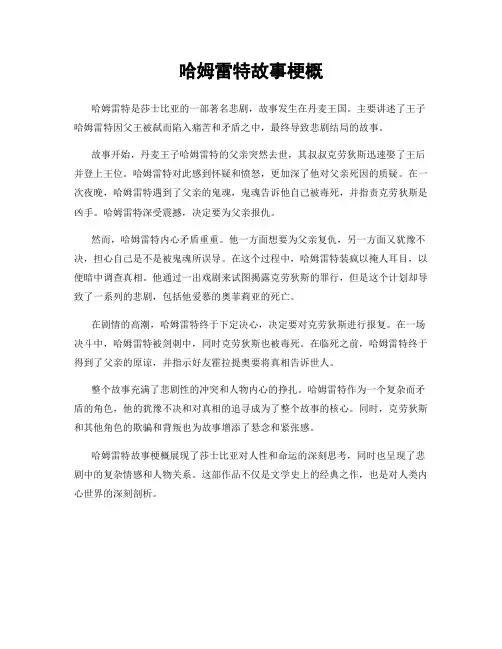
哈姆雷特故事梗概
哈姆雷特是莎士比亚的一部著名悲剧,故事发生在丹麦王国。
主要讲述了王子哈姆雷特因父王被弑而陷入痛苦和矛盾之中,最终导致悲剧结局的故事。
故事开始,丹麦王子哈姆雷特的父亲突然去世,其叔叔克劳狄斯迅速娶了王后并登上王位。
哈姆雷特对此感到怀疑和愤怒,更加深了他对父亲死因的质疑。
在一次夜晚,哈姆雷特遇到了父亲的鬼魂,鬼魂告诉他自己被毒死,并指责克劳狄斯是凶手。
哈姆雷特深受震撼,决定要为父亲报仇。
然而,哈姆雷特内心矛盾重重。
他一方面想要为父亲复仇,另一方面又犹豫不决,担心自己是不是被鬼魂所误导。
在这个过程中,哈姆雷特装疯以掩人耳目,以便暗中调查真相。
他通过一出戏剧来试图揭露克劳狄斯的罪行,但是这个计划却导致了一系列的悲剧,包括他爱慕的奥菲莉亚的死亡。
在剧情的高潮,哈姆雷特终于下定决心,决定要对克劳狄斯进行报复。
在一场决斗中,哈姆雷特被剑刺中,同时克劳狄斯也被毒死。
在临死之前,哈姆雷特终于得到了父亲的原谅,并指示好友霍拉提奥要将真相告诉世人。
整个故事充满了悲剧性的冲突和人物内心的挣扎。
哈姆雷特作为一个复杂而矛盾的角色,他的犹豫不决和对真相的追寻成为了整个故事的核心。
同时,克劳狄斯和其他角色的欺骗和背叛也为故事增添了悬念和紧张感。
哈姆雷特故事梗概展现了莎士比亚对人性和命运的深刻思考,同时也呈现了悲剧中的复杂情感和人物关系。
这部作品不仅是文学史上的经典之作,也是对人类内心世界的深刻剖析。
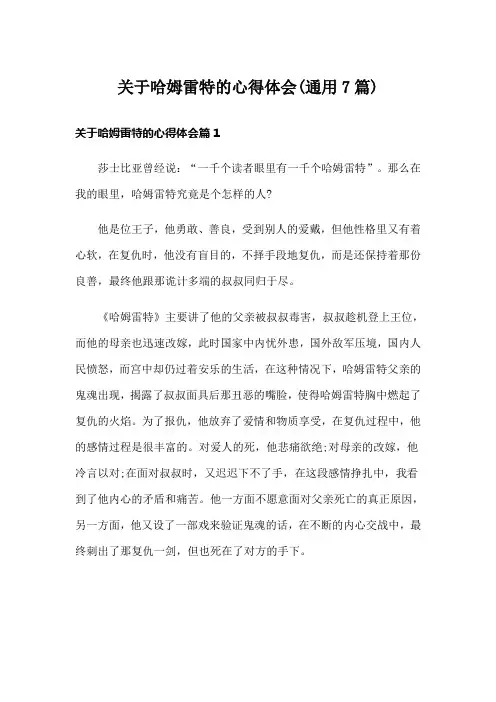
关于哈姆雷特的心得体会(通用7篇)关于哈姆雷特的心得体会篇1莎士比亚曾经说:“一千个读者眼里有一千个哈姆雷特”。
那么在我的眼里,哈姆雷特究竟是个怎样的人?他是位王子,他勇敢、善良,受到别人的爱戴,但他性格里又有着心软,在复仇时,他没有盲目的,不择手段地复仇,而是还保持着那份良善,最终他跟那诡计多端的叔叔同归于尽。
《哈姆雷特》主要讲了他的父亲被叔叔毒害,叔叔趁机登上王位,而他的母亲也迅速改嫁,此时国家中内忧外患,国外敌军压境,国内人民愤怒,而宫中却仍过着安乐的生活,在这种情况下,哈姆雷特父亲的鬼魂出现,揭露了叔叔面具后那丑恶的嘴脸,使得哈姆雷特胸中燃起了复仇的火焰。
为了报仇,他放弃了爱情和物质享受,在复仇过程中,他的感情过程是很丰富的。
对爱人的死,他悲痛欲绝;对母亲的改嫁,他冷言以对;在面对叔叔时,又迟迟下不了手,在这段感情挣扎中,我看到了他内心的矛盾和痛苦。
他一方面不愿意面对父亲死亡的真正原因,另一方面,他又设了一部戏来验证鬼魂的话,在不断的内心交战中,最终刺出了那复仇一剑,但也死在了对方的手下。
哈姆雷特作为王子,他具有治理国家的能力,但是在面对情感的选择时,他又很犹疑不决,他是个巨人型的悲剧者,这可能也是莎士比亚想要让我们了解的是性格造成的悲剧。
在书中有很多令人印象深刻的句子:“他认为人间只不过是一个荒芜不治的花园,长满了恶毒的莠草”,在这一场复仇中,我们可以体会到他内心的痛苦,这样的一个经历,给这位年轻的王子心灵投下了巨大的阴影。
鲁迅说过:“悲剧就是把人生最有价值的东西毁灭给人看”,那么这本书的意义和启示是无限的,也带给我们深深的思索。
关于哈姆雷特的心得体会篇2可能在家不知道,曾有过的《哈姆雷特》这本书。
可是,我也是勿囵吞枣,乱读了一次而已,不在乎它有哪些资料,直到父亲指出了我的错误,我才认真地读了一遍。
看了这本书,让我感觉哈姆雷特这个人既勇敢,又懦弱。
在应付雷欧提斯的挑战的时候;在应付爸爸的灵魂出现的时候;在刺死波洛涅斯的时候,他是勇敢的。
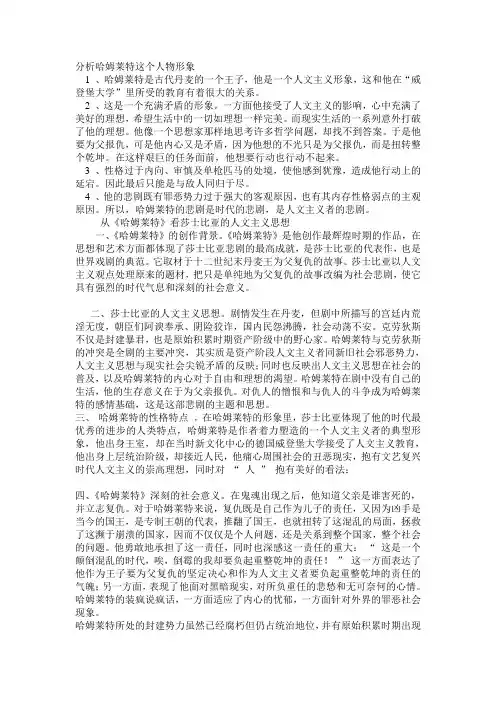
分析哈姆莱特这个人物形象1 、哈姆莱特是古代丹麦的一个王子,他是一个人文主义形象,这和他在“威登堡大学”里所受的教育有着很大的关系。
2 、这是一个充满矛盾的形象。
一方面他接受了人文主义的影响,心中充满了美好的理想,希望生活中的一切如理想一样完美。
而现实生活的一系列意外打破了他的理想。
他像一个思想家那样地思考许多哲学问题,却找不到答案。
于是他要为父报仇,可是他内心又是矛盾,因为他想的不光只是为父报仇,而是扭转整个乾坤。
在这样艰巨的任务面前,他想要行动也行动不起来。
3 、性格过于内向、审慎及单枪匹马的处境,使他感到犹豫,造成他行动上的延宕。
因此最后只能是与敌人同归于尽。
4 、他的悲剧既有罪恶势力过于强大的客观原因,也有其内存性格弱点的主观原因。
所以,哈姆莱特的悲剧是时代的悲剧,是人文主义者的悲剧。
从《哈姆莱特》看莎士比亚的人文主义思想一、《哈姆莱特》的创作背景。
《哈姆莱特》是他创作最辉煌时期的作品,在思想和艺术方面都体现了莎士比亚悲剧的最高成就,是莎士比亚的代表作,也是世界戏剧的典范。
它取材于十二世纪末丹麦王为父复仇的故事。
莎士比亚以人文主义观点处理原来的题材,把只是单纯地为父复仇的故事改编为社会悲剧,使它具有强烈的时代气息和深刻的社会意义。
二、莎士比亚的人文主义思想。
剧情发生在丹麦,但剧中所描写的宫廷内荒淫无度,朝臣们阿谀奉承、阴险狡诈,国内民怨沸腾,社会动荡不安。
克劳狄斯不仅是封建暴君,也是原始积累时期资产阶级中的野心家。
哈姆莱特与克劳狄斯的冲突是全剧的主要冲突,其实质是资产阶段人文主义者同新旧社会邪恶势力,人文主义思想与现实社会尖锐矛盾的反映;同时也反映出人文主义思想在社会的普及,以及哈姆莱特的内心对于自由和理想的渴望。
哈姆莱特在剧中没有自己的生活,他的生存意义在于为父亲报仇。
对仇人的憎恨和与仇人的斗争成为哈姆莱特的感情基础,这是这部悲剧的主题和思想。
三、哈姆莱特的性格特点。
在哈姆莱特的形象里,莎士比亚体现了他的时代最优秀的进步的人类特点,哈姆莱特是作者着力塑造的一个人文主义者的典型形象,他出身王室,却在当时新文化中心的德国威登堡大学接受了人文主义教育,他出身上层统治阶级,却接近人民,他痛心周围社会的丑恶现实,抱有文艺复兴时代人文主义的崇高理想,同时对“人”抱有美好的看法:四、《哈姆莱特》深刻的社会意义。
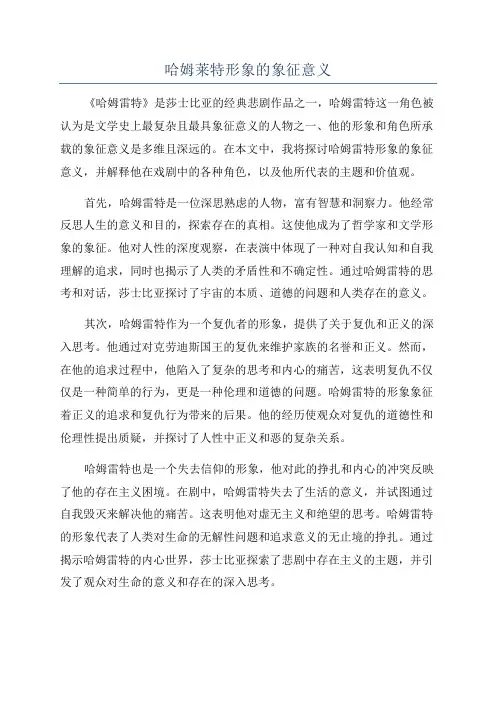
哈姆莱特形象的象征意义《哈姆雷特》是莎士比亚的经典悲剧作品之一,哈姆雷特这一角色被认为是文学史上最复杂且最具象征意义的人物之一、他的形象和角色所承载的象征意义是多维且深远的。
在本文中,我将探讨哈姆雷特形象的象征意义,并解释他在戏剧中的各种角色,以及他所代表的主题和价值观。
首先,哈姆雷特是一位深思熟虑的人物,富有智慧和洞察力。
他经常反思人生的意义和目的,探索存在的真相。
这使他成为了哲学家和文学形象的象征。
他对人性的深度观察,在表演中体现了一种对自我认知和自我理解的追求,同时也揭示了人类的矛盾性和不确定性。
通过哈姆雷特的思考和对话,莎士比亚探讨了宇宙的本质、道德的问题和人类存在的意义。
其次,哈姆雷特作为一个复仇者的形象,提供了关于复仇和正义的深入思考。
他通过对克劳迪斯国王的复仇来维护家族的名誉和正义。
然而,在他的追求过程中,他陷入了复杂的思考和内心的痛苦,这表明复仇不仅仅是一种简单的行为,更是一种伦理和道德的问题。
哈姆雷特的形象象征着正义的追求和复仇行为带来的后果。
他的经历使观众对复仇的道德性和伦理性提出质疑,并探讨了人性中正义和恶的复杂关系。
哈姆雷特也是一个失去信仰的形象,他对此的挣扎和内心的冲突反映了他的存在主义困境。
在剧中,哈姆雷特失去了生活的意义,并试图通过自我毁灭来解决他的痛苦。
这表明他对虚无主义和绝望的思考。
哈姆雷特的形象代表了人类对生命的无解性问题和追求意义的无止境的挣扎。
通过揭示哈姆雷特的内心世界,莎士比亚探索了悲剧中存在主义的主题,并引发了观众对生命的意义和存在的深入思考。
此外,哈姆雷特还是一个被分裂的形象,他的行为和选择揭示了他内心矛盾和道德困境。
他一方面渴望为父亲复仇,另一方面又因为复仇行为引发的暴力和血腥感到恐惧和犹豫。
这种内心的分裂影响了他的决策和行为,也象征了他对现实世界和个人责任之间的冲突。
哈姆雷特的形象揭示了人类困于选择和以行动面对现实的复杂性。
从这个角度上看,哈姆雷特在象征上代表了人类在道德冲突中的困境和挣扎。
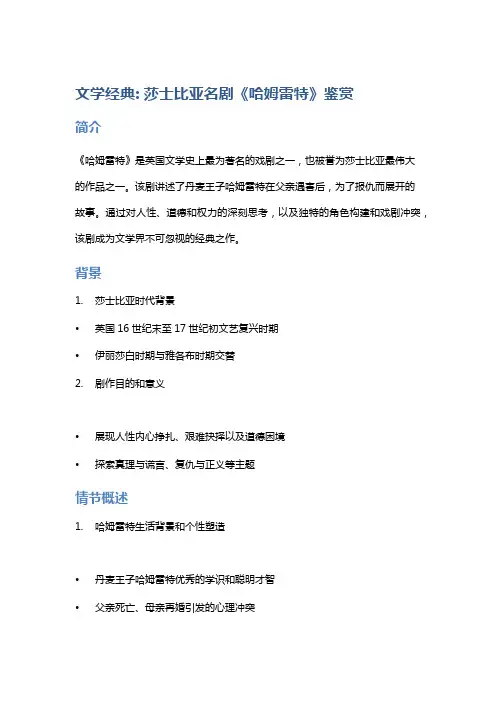
文学经典: 莎士比亚名剧《哈姆雷特》鉴赏简介《哈姆雷特》是英国文学史上最为著名的戏剧之一,也被誉为莎士比亚最伟大的作品之一。
该剧讲述了丹麦王子哈姆雷特在父亲遇害后,为了报仇而展开的故事。
通过对人性、道德和权力的深刻思考,以及独特的角色构建和戏剧冲突,该剧成为文学界不可忽视的经典之作。
背景1.莎士比亚时代背景•英国16世纪末至17世纪初文艺复兴时期•伊丽莎白时期与雅各布时期交替2.剧作目的和意义•展现人性内心挣扎、艰难抉择以及道德困境•探索真理与谎言、复仇与正义等主题情节概述1.哈姆雷特生活背景和个性塑造•丹麦王子哈姆雷特优秀的学识和聪明才智•父亲死亡、母亲再婚引发的心理冲突2.鬼魂出现和告知真相•哈姆雷特遭到已故父亲鬼魂的探访并得知真相•王父被兄弟谋杀,要求哈姆雷特报仇3.计划与扮演疯子•哈姆雷特设下陷害叔父的计划•通过表演疯子来掩盖自己的真实意图4.悲剧与复仇行动•多个角色隐秘行动和欺诈导致了悲剧的发生•最终哈姆雷特将复仇进行到底5.结局与伦理问题•主要人物命运的不幸结局•关于道德、复仇和宿命方面存在的思考角色分析1.哈姆雷特(Hamlet)•智慧卓越、反思敏锐而常常犹豫不决,经典形象之一。
2.克劳迪斯(Claudius)•国王,哈姆雷特的叔父,自私狡诈,谋杀了自己的兄弟。
3.奥菲利亚(Ophelia)•哈姆雷特的女友,最终因感情受挫而精神崩溃。
4.波洛尼厄斯(Polonius)•宫廷大臣,被哈姆雷特误杀。
主题分析1.真相和谎言•人性中的欺骗、欺诈和隐藏真相2.内心挣扎和道德困境•复仇与正义、忠诚与背叛等价值观之间的冲突3.死亡与后果•死亡对生命意义和命运造成的影响影响与价值1.文学价值•以丰富多彩的语言、深入剖析人性内在冲突为特点,构建了众多经典形象和著名台词。
2.文化影响力•对全球文化产生着广泛而深远的影响,成为戏剧艺术研究中不可或缺的部分。
3.思想启示•引发对复仇、道德、人性等重要议题的思考与讨论。
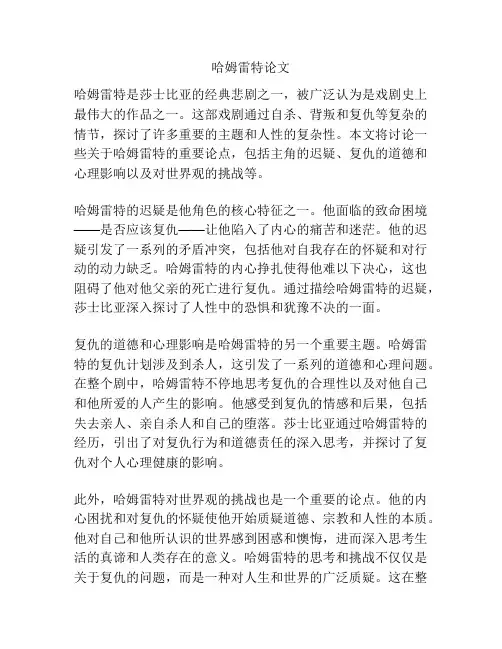
哈姆雷特论文哈姆雷特是莎士比亚的经典悲剧之一,被广泛认为是戏剧史上最伟大的作品之一。
这部戏剧通过自杀、背叛和复仇等复杂的情节,探讨了许多重要的主题和人性的复杂性。
本文将讨论一些关于哈姆雷特的重要论点,包括主角的迟疑、复仇的道德和心理影响以及对世界观的挑战等。
哈姆雷特的迟疑是他角色的核心特征之一。
他面临的致命困境——是否应该复仇——让他陷入了内心的痛苦和迷茫。
他的迟疑引发了一系列的矛盾冲突,包括他对自我存在的怀疑和对行动的动力缺乏。
哈姆雷特的内心挣扎使得他难以下决心,这也阻碍了他对他父亲的死亡进行复仇。
通过描绘哈姆雷特的迟疑,莎士比亚深入探讨了人性中的恐惧和犹豫不决的一面。
复仇的道德和心理影响是哈姆雷特的另一个重要主题。
哈姆雷特的复仇计划涉及到杀人,这引发了一系列的道德和心理问题。
在整个剧中,哈姆雷特不停地思考复仇的合理性以及对他自己和他所爱的人产生的影响。
他感受到复仇的情感和后果,包括失去亲人、亲自杀人和自己的堕落。
莎士比亚通过哈姆雷特的经历,引出了对复仇行为和道德责任的深入思考,并探讨了复仇对个人心理健康的影响。
此外,哈姆雷特对世界观的挑战也是一个重要的论点。
他的内心困扰和对复仇的怀疑使他开始质疑道德、宗教和人性的本质。
他对自己和他所认识的世界感到困惑和懊悔,进而深入思考生活的真谛和人类存在的意义。
哈姆雷特的思考和挑战不仅仅是关于复仇的问题,而是一种对人生和世界的广泛质疑。
这在整个剧中体现出来,尤其是通过哈姆雷特的著名的“生存还是毁灭”独白。
总的来说,哈姆雷特是一部充满复杂性和深度的戏剧,探讨了许多重要的主题和人性的复杂性。
哈姆雷特的迟疑、复仇的道德和心理影响以及对世界观的挑战,都为观众提供了深入思考的机会。
莎士比亚通过刻画哈姆雷特的内心世界和思考过程,揭示了人性的多面性和生活的复杂性。
《哈姆雷特》复仇、背叛与成长的戏剧人生《哈姆雷特》是莎士比亚创作的一部戏剧作品,被广泛认为是世界文学史上最伟大的作品之一。
该剧揭示了复仇、背叛与成长这些人性的复杂主题,通过主人公哈姆雷特的经历,深刻探讨了人们在不公正的环境中如何面对困境、挣扎并逐渐成长的过程。
故事背景设定在丹麦王国,哈姆雷特是丹麦国王哈姆雷特的儿子,他的父亲在被自己的兄弟克劳狄斯谋杀后成了幽灵,向哈姆雷特透露了真相。
这个真相使哈姆雷特备受刺激,他感到被背叛,于是决定复仇,报复克劳狄斯。
这一决定成为哈姆雷特人生的转折点,也是他成长的契机。
复仇作为该剧的核心主题,通过哈姆雷特在整个剧中的思想斗争和行动表现出来。
一方面,哈姆雷特深深地沉浸在对父亲被谋杀的痛苦中,对克劳狄斯充满了憎恨和愤怒;另一方面,他又深深地陷入了对真相的怀疑和对人性的猜疑中。
哈姆雷特不仅质疑自己是否应该成为执行者,还质疑仇人的罪行是否真实。
这种复杂的思想斗争和挣扎让哈姆雷特在复仇之路上变得犹豫不决。
背叛是《哈姆雷特》中另一个重要的主题。
不仅有对国王的背叛,还有对亲人和朋友的背叛。
克劳狄斯背叛哈姆雷特的父亲,篡位夺权;哈姆雷特的朋友奥菲利亚由于父亲的死和哈姆雷特的反常举止,被操控,最终自杀。
这种背叛让哈姆雷特感到失望和悲愤,同时也让他开始反思社会中的不公和背叛。
然而,在复仇与背叛的背后,哈姆雷特逐渐意识到成长的重要性。
在经历了父亲的死亡和背叛后,他开始思考人生的意义和价值,并且不断成长和成熟。
他通过戏剧中的演出,通过和巡演剧团的交流,逐渐明白人生的虚幻和伪善,懂得了如何从自己的戏剧人生中引发对社会现实的思考和启发。
他通过戏剧来揭示真相,并通过戏剧中的角色来窥探自己内心深处的困惑。
此外,《哈姆雷特》中充斥着各种复杂的人物关系。
尤其是哈姆雷特与他的曾经爱慕的奥菲利亚之间的关系给戏剧增添了一种深情的色彩。
奥菲利亚在受到父亲和国王的操控时,对哈姆雷特的行为感到无法理解,最终精神崩溃。
一千个哈姆雷特哲学道理
哈姆雷特是莎士比亚最著名的作品之一,它提供了丰富的哲学观点,引导了许多人对人生和道德的思考。
在本文中,我将分析一千个哈姆雷特哲学道理,以帮助读者更好地理解该作品的核心意义。
首先,哈姆雷特强调了个体本质的哲学观点,即“我们只能控制自己,而无法控制外界。
”这一观点可以用来解释行为的原因和结果,同时也可以成为追求高尚人生的启示。
此外,哈姆雷特还指出,“智
慧是最强大的武器,因为智慧可以克服任何困难。
”这句话表明,只
有智慧才能帮助我们克服任何挑战,并在困境中取得胜利。
此外,哈姆雷特也指出,“你可以包装虚伪,但不能瞒过上帝。
”这一观点把欺骗联系到宗教信仰,提醒人们不要欺骗自己,也不要试图打败上帝。
而“不要强征自己,你会比别人拥有更多”,则是提醒
人们要尊重自己的意志并坚持自己的信念,从而获得更多的成就。
哈姆雷特还表达了一些关于人与人之间关系的哲学道理。
例如,他认为“愤怒是一种丑陋的毛病,它会让你看起来像受尽折磨的傻瓜。
”这句话表明,愤怒是一种不受欢迎的行为,而且它可以使人看起来丑陋而无助。
此外,哈姆雷特也指出“你必须尊重别人,因为你也需要被别人尊重”,这句话提醒人们,我们应该尊重别人,以获得别人的
尊重。
本文简要地分析了一千个哈姆雷特哲学道理,它们提供了关于人的本性、行为的原因和后果、人际关系以及宗教信仰的重要观点。
从这些哲学观点中,读者可以获得更多智慧,并可以用这些观点来构建
自身的人生理念。
只有深入思考哈姆雷特的思想,才能更好地理解这部伟大的作品。
英雄的堕落:《哈姆雷特》的主题分析《哈姆雷特》是莎士比亚的经典戏剧之一,被誉为世界文学史上最伟大的作品之一。
该剧的主题之一是英雄的堕落,通过揭示主人公哈姆雷特的变化和境遇,展示了权力、背叛和悲剧的深刻内涵。
在剧中,哈姆雷特是一个出色的学者和优秀的战士,备受称赞和敬佩。
然而,随着剧情的发展,我们目睹了他的堕落。
他开始变得疑神疑鬼、忧心忡忡,无法做出决策,并渐渐沉溺于自我怀疑和悲伤之中。
哈姆雷特的堕落源自他对父亲被谋杀的痛苦和对母亲与克劳狄斯之间关系的愤怒。
在此过程中,哈姆雷特的意志逐渐被瓦解。
他开始怀疑世界的道德价值观,并展现出一系列变化的情绪状态,如愤怒、悲伤和痛苦。
随着他的堕落,哈姆雷特失去了对自己和他人的信任,使得他陷入了不断循环的痛苦和迷茫之中。
这个主题在剧中得到了深入的探讨和展示。
莎士比亚通过剧中其他角色的言行,进一步强调了英雄的堕落。
克劳狄斯和皮诺西斯作为权力欲望的象征,为哈姆雷特的堕落提供了外因因素。
各种背叛和阴谋包围着哈姆雷特,使得他的心理状态日益动荡,最终导致悲剧的结局。
与此同时,哈姆雷特的堕落也揭示了社会和人性的黑暗面。
作者通过哈姆雷特的遭遇揭示了权力的腐败、欺诈与复仇的无休止循环,呼吁人们应反思和审视这些问题。
因此,《哈姆雷特》的主题不仅仅是个体英雄的堕落,也是整个社会的病态现象的映射。
在剧中,哈姆雷特最终付出了巨大的代价,包括自己和他人的性命。
他的堕落和悲剧使观众思考人性的复杂性和道德的价值。
通过哈姆雷特的故事,我们看到了权力的腐败、痛苦的剧痛以及对真实与虚伪的挣扎。
莎士比亚通过这种描绘不仅仅展现了哈姆雷特个体悲剧的深刻内涵,更凸显了人类共同面临的问题和困境。
总结起来,《哈姆雷特》这部作品是一部关于英雄堕落的经典戏剧。
从哈姆雷特作为英雄的起伏心路,到揭露社会和人性的黑暗面,这部作品引起了观众对权力、背叛、复仇等议题的深思,并通过描绘英雄的堕落,探讨了其背后的深层意义。
莎士比亚以其独特的笔触和深邃的思考,将《哈姆雷特》打造成了一部永恒的经典,令人仍在演绎与思考之中。
关于哈姆雷特的作文300字
相信大家都读过《哈姆雷特》吧。
它是英国的莎士比亚写的。
莎士比亚写过喜剧集,也写过悲剧集。
而《哈姆雷特》正是悲剧集中的一篇。
在剧中,哈姆雷特从鬼魂(老国王,哈姆雷特的父亲)那儿知道知道了是叔叔(新国王)杀了自己的父亲。
于是,不惜扮成了一个得了某种癫狂病的人,然后又委托戏团表演了一出威尼斯大公被杀害,其遗孀嫁给了凶手的故事,这与丹麦先王驾崩的情况非常相似。
在剧中,还有个叫奥菲利娅的女孩,是御前大臣波洛涅斯的女儿。
但她却因为王子的“癫狂病”,父亲的暴卒和兄长雷欧提斯的失踪而不断焦虑,悲伤,以至于自己精神失常。
她在宫廷周围边唱歌边撒花,游荡了半天,终于来到了一个河岸失足溺水身亡。
我觉得,在剧中,最可怜,最无辜的`就是奥菲利娅。
她美丽,她善良,却因为宫廷里的阴谋而死。
在剧中,还有一个“人物”,和其他人相比,虽然他的出场次数不多,可他却似乎拥有支配故事情节发展的决定性的作用。
他,就是先王的鬼魂。
在我看来,在这本书里我最喜欢的就是哈姆雷特。
事实上,说喜欢他,不如说我佩服他。
他纯洁,高尚,有道德,有决心有……同时,我也很可怜他,因为他家破人亡。
哈姆雷特研究报告哈姆雷特是莎士比亚最著名的戏剧之一,被广泛认为是世界文学史上最伟大的作品之一。
本篇报告旨在对《哈姆雷特》进行研究和分析,包括作品的背景、主题、人物形象和结构等方面。
一、作品背景:《哈姆雷特》是莎士比亚于16世纪末写成的悲剧,故事设定在丹麦王国,讲述了主人公哈姆雷特在困惑、痛苦和自我怀疑之间挣扎的故事。
该剧探讨了权力、道德、疯狂和复仇等主题。
二、作品主题:1. 失去信任和背叛:剧中多个角色经历了背叛和失去信任的境地。
哈姆雷特的父亲被自己的弟弟克劳迪斯杀害,他的母亲快速嫁给了凶手。
这些事件导致哈姆雷特怀疑所有人的真实动机和行为。
2. 死亡和腐朽:《哈姆雷特》中充满了对死亡和腐朽的描绘。
哈姆雷特经常思考生与死的边界以及人类存在的意义。
他的葬礼场景,墓地场景以及对尸体的描写都强调了死亡主题。
3. 疯狂与理智:哈姆雷特假装疯狂以便掩盖对克劳迪斯的复仇计划。
这激起了关于疯狂和理智的讨论。
剧中还有其他角色也扮演着疯狂的角色,如奥菲利亚和拉耶尔。
三、人物形象:1. 哈姆雷特(Hamlet):主人公,丹麦王子。
他是一个富有思想、矛盾和情绪化的角色,经历了个人和道德的挣扎。
2. 克劳迪斯(Claudius):哈姆雷特的叔叔,也是他的父亲的杀害者。
他是一个复杂的角色,代表着权力和背叛。
3. 奥菲利亚(Ophelia):哈姆雷特的爱人。
她经历了悲剧性的爱情,最终导致了精神崩溃和自杀。
4. 波洛涅斯(Polonius):哈姆雷特的父亲,军事顾问。
他是一个自私和阴险的角色,对哈姆雷特的行为起到了重要的推动作用。
四、作品结构:《哈姆雷特》以五幕的形式呈现。
每个幕都有其独特的情节发展和高潮。
剧中有大量的对白和独白,用以展示角色的内心思想和情感。
总结:《哈姆雷特》是一部充满思考和复杂性的悲剧,通过其深刻的主题、生动的人物形象和巧妙的结构,成功地揭示了人性的复杂和矛盾。
该作品对后世戏剧和文学作品产生了深远的影响,并持续被各类观众和学者研究和赏析。
哈姆雷特故事梗概在丹麦国王埃尔辛尔的宫廷里,王子哈姆雷特陷入了一段艰难的时期。
他的父亲突然去世,母亲不久后便与其叔叔克劳狄斯结婚,这使得哈姆雷特倍感痛苦和愤怒。
更令他感到不安的是,他的父亲的鬼魂出现在宫廷,告诉他自己是被克劳狄斯谋杀的,要哈姆雷特为他报仇。
哈姆雷特陷入了内心的挣扎,他不知道鬼魂是否是真的,也不确定自己是否有勇气去执行报仇的任务。
他决定装疯,以便可以更好地了解真相。
在他的伪装下,他观察了克劳狄斯和他母亲的行为,发现了一些不对劲的地方。
同时,他也对自己的内心进行了深刻的反省和思考。
在这段时间里,哈姆雷特与他的朋友霍拉提奥和奥菲利娅之间的关系也发生了变化。
他对奥菲利娅表现出了冷淡,使她感到困惑和伤心。
而与霍拉提奥的交谈却让他感到宽慰,他可以在霍拉提奥身上找到一些支持和理解。
在宫廷里,克劳狄斯和他的顾问波洛尼厄斯密谋,试图找出哈姆雷特的真实意图。
他们安排了一场戏剧,内容与哈姆雷特父亲的死有关。
哈姆雷特观察了克劳狄斯在观看戏剧时的反应,确认了他的罪行。
在一次与母亲的对话中,哈姆雷特不小心杀死了波洛尼厄斯,这使得他的处境更加危险。
克劳狄斯决定派哈姆雷特去英国,以摆脱他的威胁。
但是哈姆雷特设法逃脱,并返回丹麦。
回到丹麦后,哈姆雷特发现奥菲利娅已经疯了,她的父亲的死使她无法承受。
哈姆雷特深感内疚和悲伤,他对奥菲利娅表现出了真挚的爱意。
不久后,他们接到了奥菲利娅的死讯,这使得哈姆雷特的心情更加沉重。
在一场决斗中,哈姆雷特与克劳狄斯进行了激烈的对决。
在混乱中,克劳狄斯被哈姆雷特刺死,同时也被毒死。
在生命垂危之际,哈姆雷特终于得知了真相,他明白了自己的使命,也明白了自己的命运。
哈姆雷特的故事以悲剧的结局收场,他在报仇的过程中失去了亲人和朋友,最终也失去了自己的生命。
然而,他的坚韧和勇气,以及对真相的追求,使他成为了一个永远不会被遗忘的传奇人物。
目录论文摘要 (2)Abstract (3)Appreciating the Tragic from the Works of Shakes peare’s Hamlet (4)Ⅰ. Introduction (4)Ⅱ. About the history of tragedy (5)Ⅲ. The Tragedy’s Characters’ Analysis (8)Works Cited (19)论文摘要威廉·莎士比亚是欧洲文艺复兴时期的代表作家,是英国最伟大的剧作家和诗人,也是世界文学史上最有影响的著名作家之一。
他生于1564年,逝世于1616年。
莎士比亚一生共写了37部戏剧、154首十四行诗和两首叙事长诗。
悲剧《哈姆雷特》代表莎士比亚的最高戏剧成就,成为世界各国人民最喜欢的文学作品之一。
在《哈姆莱特》这一不朽剧作中,始终存在着善良与邪恶之间一系列激烈的矛盾冲突。
哈姆莱特作为该剧的主要角色,他的命运不可避免地处于这激烈矛盾冲突的漩涡之中。
身为王子的哈姆莱特被莎翁塑造为生命之美的典型,他年轻英俊,坚毅勇敢,热爱自己的国家,热爱自己的父王和母后,有着心爱的恋人奥菲利亚,可以说,他的生命正处于人生最美好的时刻。
然而,这美好的生命时光瞬息之间又消失了,他是处于一种什么样的环境之中呢?我们看到,当时的丹麦宫廷一片混乱,老王奇怪地驾崩,王后改嫁新王,国外敌军压境,国内群情激愤、一触即发,而宫中却在通宵达旦地酗酒取乐,这一切,都在哈姆莱特年轻美好的生命中投下了巨大的阴影,从而使他郁郁寡欢,认为人间不过是"一个荒芜不治的花园,长满了恶毒的莠草",这些已经为王子年轻的生命注入了悲剧的因素。
随着老王鬼魂的出现,宫廷内幕的揭开,谋杀罪行的暴露,王子心中烈火的燃起,悲剧的帷幕拉开了……面对阴险奸诈的新王,哈姆莱特开始了孤身复仇的行动:为了复仇,他失手杀死了恋人的父亲;为了复仇,他佯装疯狂失去了深爱的情人;为了复仇,他对软弱的母亲冷言相向;为了复仇,他忍受着失去友情的痛苦。
最后,在一场血淋淋的宫廷决斗中,他虽然杀死了阴险狡诈的新王,但自己的生命也结束在这"牢狱"般的宫廷中。
鲁迅曾经说过:"悲剧就是将人生的有价值的东西毁灭给人看。
"哈姆莱特作为一个深受广大群众爱戴的王子,他身上具备整顿局势、治理国家、报仇雪恨的能力。
然而面对着以阴险奸诈的新王为代表的强大的封建势力,作为一个资产阶级人文主义者,他始终把这种和人民紧密相连的事业看做个人的仇恨而孤军奋战,因此,他的悲剧既是真善美与邪恶力量相冲突的悲剧,也是一个人文主义时代的悲剧。
关键词:哈姆雷特莎士比亚悲剧性人文主义AbstractWilliam Shakespeare is the representative of the European Renaissance writers, is the greatest playwright and poet in United Kingdom, also one of the most influential writers in the literary history of the world. He was born in 1564, and died in 1616. Shakespeare wrote a total of 37 plays, 154 sonnets and two narrative poems in his lifetime. Tragedy "Hamlet" represents the highest drama of Shakespeare's achievements and becomes the most favorite literary one. In "Hamlet," the immortal plays, there was always a series of intense conflict between good and evil. Hamlet as a drama major role, his fate was inevitable trapped in this intense vortex of contradictions and conflicts. As a prince Hamlet had been shaping for a type of beautiful life by Shakespeare. He is young and handsome, courageous and perseverant, and he loves his country, his father and mother, as well as he has a beloved lover Ophelia. All these can be said that he was at the best moment in life. However, this wonderful time of life was rapidly disappeared, so what kind of environment did he exist in? We can see that at that time the Danish court was in a chaotic condition: the strange death of Pharaoh, Queen remarried to new king, foreign enemy pressed on to the border , the revulsion from domestic public was on the verge of breaking out. In contrast, in the palace all the people were performing various kinds of entertainment all through the night. All of these casted a huge shadow on this young and lovely prince and made him unhappy. In his opinion, the world is just "`tis an unweeded garden, that grows to seed", which had motivated the young prince's life into a tragic circumstances. With the emergence of the ghost of Pharaoh, the revealment of the court, the exposure of murder, the Prince ignited the fire in his heart, the tragedy began appear ... ...Face to the insidious and treacherous king, Hamlet started his unaccompanied revenge: In order to revenge, he killed his lover’s father accidentally; he lost lover because he pretended to be crazy; he treated his mother with relentlessly attitude; he endured the pain of the loss of friendship. Finally, in a bloody fight in court, even though he killed the new king, he also brought his life into an end. As a beloved prince, Hamlet could have had capability to rectify the situation, govern the country and take the revenge. However, faced to the treacherous king, represented by powerful feudal forces, as a bourgeois humanist, he always consider this as a individual revenge but not a cause linked closely with the people and stick to go it alone. Therefore, his tragedy not only showed the conflict between kindness and evil forces, but also a tragedy in humanistic era.Key words: Hamlet, Shakespeare, tragedy, Humanism, conflictAppreciating the Tragic from the Works of Shakespeare’s HamletⅠ. IntroductionDanish Prince Hamlet in Wittenberg University suddenly confronted a series of adversity and family tragedies during his study: the violent death of his father, Uncle Claudius usurped the throne, his mother married to his uncle. All these made him into an extremely pain. Later, the ghost of his father told him that he was poisoned by his uncle. Hamlet believed that his revenge for his father was not only for himself, but the problem of the entire community and the country'. He himself should take up this important task of restructuring the course of events. In addition to consider all aspects of the issue, he was afraid of divulging his feelings and ghost’s false, for fear of falling into the wrong trap. He was so upset and depressed that he had to disguise himself as a fool to mislead the enemy, meanwhile waiting for an opportunity for revenge. Claudius was aware of the danger and tried his best to remove him. And in order to further confirm the fact, Hamlet also instructed his troupe into the palace to play on a performance in which a wicked man killed his brother, seized the throne, and married to his brother’s wife. Claudius was extremely frightened, withdrew from the scene in panic. Hamlet's mother attempted to persuade him to forbear, but she had been accused of her charges, then Hamlet unintentional homicide his lover Ophelia’s father indignantly. Cunning Claudius then sent Hamlet as an ambassador to Britain, in fact he secretly ordered him executed. Hamlet detected this plot and fled to Denmark on the half-way. After he came back, Ophelia had been crazy because of her father’s death and her lover’s departure, then she fell into river and drown to death. Hamlet was angry and sadly then he was trapped into Claudius` deadly plan. As a result, Hamlet and Laertes both suffered the poisonous sword. The queen drunk the poisonous wine, and the king also was stabbed to death. Prince Hamlet entrusted his friends to disseminate his will. This story of a prince’s revenge based on a 12th century Danish. The author considers humanism as his perspective, and this simply story about revenge for father is transformed into a tragedy reflecting an outlook of times with a strong anti-feudal sense. The adoption of an ancient palace vendetta story ruthlessly exposes the dynasty of feudal autocracy headed by Claudius. Meanwhile, Prince Hamlet, represented the humanist, his anti-feudal struggle against tyranny was given a warm appreciation and profound sympathy. Hamlet represents the image of progressive idea of humanism and aspirations at that time, and this book is oneof the world famous literary masterpieces in the art of a typical one.Ⅱ. About the history of tragedyTragedy has a profound beauty, the significance of the existence is that it is not only to earn the audiences or readers` tears with sympathy, but through the whole process of the tragedy, includes the emergence, development and the outcome of the story to arouse people’s awareness to the think about the meaning of life seriously .Greek tragedy often takes the hopelessness demonstrated under the irresistible fate as its theme, it is also known as the fate tragedy. Ancient Greek tragedy in general describes the conflict between the protagonist’s individual will and the fate. As early as in ancient Greek mythology, the fate is the supreme power to control God and people. In accordance with the concept of the ancient Greeks, fate is irresistible and unknown, which dominates people and God. The background in which this concept is introduced is that the mankind is living in the context of low productivity period.The so-called "fate" takes the necessity of the objective regulation as its essence. Limited to a low level in thought and science, the ancient Greeks can not understand it. The so-called conflict between man and the fate actually reflects the conflicts between people and the outside world environment, between people. Fate tragedy reflects the contradictions with a special form by ancient Greeks. The three poets have three different understanding about fate. From the ancient Greek tragedy, we can see the development of the fate concept which constantly embodies the humanism.Aeschylus was known as the "Father of the tragedy". The poet, as the representative writer during the formation of the ancient Greek tragedy, whose view about fate excessively inherited the more traditional concept owned by the ancient Greeks. Aeschylus regards fate as a specific God. He thinks that fate dominates all of the things, including the disposal of God, while he also stressed the human will. Therefore, he tends to show the darkness of life, but as a devout monotheist, he doesn’t portray the world as a hell. He warned his countrymen who are keen for infighting: the conviction of Providence will bring the people to justice and harmony. Greek tragedy’s early concepts on fate have a religious and divine nature, which is the ideal embodiment of human nature as well as enlightenment of humanity.The second tragedy poet, Sophocles put forward doubts and challenges about the destiny. In his view, the God of fate is not specific but a mysterious and elusive force, because there is an evil natureof teasing on it. The hero who has courage to protest the fate is worthy of sympathy and praise, although the final outcome can only be a tragedy. Stressed a resistant and strong will against fate, his view on fate also became the representative one in this phase of ancient Greek tragedy. In Sophocles' works, the tragedy is no longer a person becomes the plaything of God or fate, but the frustrated end got after the effort to counter tragic fate imposed on them. The protagonist in his book is changed from slavery into the hero of the fate. In Sophocles` mind, although the fate is irresistible, its justice and rationality is doubtful. In this stage the progressive fate concepts of the tragedy lies in affirming the value of human and the view on humanism is more manifested deeper.Euripides far surpassed the two predecessors; the ancient Greek tragedy is more progressive. He has completely shifting attention from God to the people. He criticized the theistic ethics and do not believe in fate. He believed that the fate of the people exist in themselves, and stressed that all depends on human’s effort and the destiny is seized in their own hands. By this period, the ancient Greek tragedy in the concept of the fate has been fully reflected the humanism so that they attach importance to the role. The tragedy insists that human effort is the decisive factor and confirms that the people have courage to change the status quo to fight for their own rights, all of which are more progressive and modern than their predecessors.Although the three tragedy writers have different concepts of fate, they are around the same theme of conflict between person's will and destiny. In their works, in different ways, in the face of falling into the unjust fate, the heroes are determined and dedicated to the conduct of the heroic resistance. Hamlet shaped by Shakespeare, whose artistic image and his character is followed the characteristics of tragic art, so that the protagonist Hamlet was a great successful shape.With regard to the substance of Shakespeare's tragedy has always been diverse. Relatively there are well-known character tragedy, the social tragedy and the fate tragedy.As the endless depression, indecision and hesitation, Hamlet delayed time, such as to result in the loss of the opportunity for revenge. He was entrusted by the ghost of his father. Two months later, he still immersed in depression, even pretend to be mad. If we say that this is out of prudence, but after he arranged the "Mouse Trap", then the truth had been disclosed, he should take action to revenge. Especially when Claudius was praying alone, he could have attacked him, taking execution of the sinner, but he also gave up the opportunity. No matter what is the reason for the delay, but his actionswhat he does has showed his indecision and melancholy, which is no doubt constitute one of the reasons for the formation of the tragedy.However, it is unilateral that we regard tragedy caused just by the shortcomings and weaknesses showed on the character. The tragedy of Hamlet clearly has a more direct relationship with the powerful and evil forces. Shakespeare's tragedy was also known as the social tragedy, which is introduced by the contradiction between the humanistic ideals and the social reality in United Kingdom. "Hamlet" displays the conflicts between humanistic ideals conforming to the requirements of the times and the evil forces caused by the feudal forces and capitalist primitive accumulation. Thus problems impeded the realization of the ideal of humanism, instead of forming a dark and cruel era, causing the tragedy of Hamlet.Of course, another force can not be ignored, which is fate. However, it is inappropriate that completely considering Shakespeare's tragedy to be the fate tragedy, because in Shakespeare's tragedy, the hero is not entirely controlled by fate and not indifferent to their own destiny or human well-being. While to a large extent, the formation of the tragedy is exactly the result of the choice of freedom, which means the hero’s character is closely related to the formation of the tragedy though it isn’t a fundamental factor. Nevertheless, we refuse to recognize that it is the fate of tragedy, which does not mean that the complete denial of the fate concepts concept, in fact, Shakespeare's tragedy indeed exist a supreme mysterious force which reigns the world. This mysterious power gives rise to ignorance and blindness of people. They feel helpless in dealing with disaster despite they have tried their best, so that the hero of the tragedy doomed to suffer misfortune. And Hamlet is dead to end up.In the tragedy, especially the medium-term tragedy, friendship, love, affection is so fragile that it is believed thoroughly that on a secular sense, all these feelings are hopeless and invalid. In order to satisfy their own lust for power and passion, Claudius regardless of brotherhood became a murder of his brother, who usurped the throne, persecute nephew. Just two months after the old king `s dead, Gertrude remarried to the new king, who murdered his husband. As the most beloved girl, Ophelia also can not understand Hamlet's difficulties. Besides, best friends, also act as pawns of the enemy.Faced with “the weary, stale, flat, and unprofitable world” and "unweeded garden"; Faced with the fact that father was assassinated, uncle usurped the throne, mother committed incest, and friends betrayed the friendship, Shakespeare chooses to Hamlet trapped into depression even go crazy but nottake revenge for his father, nor allow him to restructure the course of events, which is the learning emerged in the history of the famous writer Shakespeare: Hamlet's delay.Ⅲ. The Tragedy’s Characters’ Analysis3.1 The Tragedy of Hamlet---A Hesitate and Depressed AvengerIt is undoubtedly that Hamlet’s most outstanding performance in character is his indecision. Faced with the fact that his father was poisoned, his mother was possessed by his uncle, royal power was thieved, the state was coveted, Hamlet had a strong desire for revenge: “Rest, rest, perturbed spirit!/So, gentlemen,/With all my love I do commend me to you:/And what so poor a man as Hamlet is/May do, to express his love and friending to you ,/God willing, shall not lack. Let us go in together;/And still your fingers on your lips ,I pray./The time is out of joint; O cursed spite,/That ever I born to set it right!/Nay, come, let’s go together.” Roar, swear, which expressed determinedly Hamlet is apodictic to their firm belief in revenge. But on the other hand, about kill the enemy, a seemingly simple move, Hamlet has showed the unusual concerns. He should have had several occasions to kill enemy, but in this complex thought, the Revenge plans always failure to achieve success. Even when he encountered the enemy praying for his own sins, the idea of revenge just flashed, and then he transferred to the thinking of the value of time: “Now might I do it pat, now he is praying;/ And now I’ll do it: and so he goes to heaven; /And so am I revevg`d. That would be scan`d:/A villain kills my father; and for that,/I, his sole son, do this same villain send/To heaven.” So, first of all, Hamlet’s revenge turned into an ideological struggle.“But that the dread of something after death, /The undiscover`d country from whose bourn/No traveler returns, puzzles the will,/And thus the native hue of resolution/Is sicklied o`er with the pale cast of thought,/And enterprises of great pith and moment/With this regard their currents turn awry,/And lose the name of action.” A revenge plan was interpreted a painful breakout of thinking. In this process, Hamlet constantly felt the darkness of the community, trying to let himself into this dark world, and in the same ways to deal with the enemy; but belief in humanity and justice were performing the instinctive resistance. In these ideological conflicts, so called tit-for-tat, Hamlet carried out a difficult transformation and choices. “and indeed it goes so heavily with my disposition that this goodly frame, the arth, seems to me a sterile promontory; this most excellent canopy, the air, look you, this brave o`er hanging firmament, this majestical roof fretted with golden fire, why, it appears no other thing to me but a foul and pestilent congregation of vapours. What a piece of work is a man! How noble in reason! how infinite in faculty! in form , in moving, how express and admirable! In action how like anangel! In apprehension how like a god! The beauty of the world! The paragon of animals! And yet, to me, what is this quintessence of dust?”Pay attention, here, Hamlet’s tone is sarcastic. This not only expressed his suspicion on the status of persons, but also reflected a kind of order concept of the times. So he began to survey everything around him with a doubtful attitude: the hypocrisy of human nature, the inconstancy of human relationship, the injustice of world. . . . . . Finally, finally such suspicion reached a state of apex:"To be, or not to be". His top priority is to revenge, with the revitalization of the country. This overloaded thinking for the meaning of life no doubt played a role of intensifying Hamlet's indecision.The fate depends on the character, which is an eternal truth. The tragic character of Hamlet lays a foundation for his tragic fate. As this kind of character, he had been suffering hard ideas of revenge. Revenge had become his all. All of these caused that he coldly treat his coward mother , turned a blind eye to the beloved woman, killed his wife's father by himself, and eventually he fell into the trap laid by enemy. Finally, finally he achieved the desire for vengeance, but all nice things fell to pieces: Hamlet's ambition, lover’s young life, mother's fragile survival.Good things are destroyed by a near-perfect person, which is a tragedy. The root cause of this tragedy is Hamlet’s indecision in character, so this is the tragedy of character.(A) IdealismIn Hamlet's character, there is a strong tendency to idealize. He was dedicated himself on human life, the universe, as well as good and evil of the idealized natural society, in which he took the ethical values as a yardstick to measure all the people and things around. There is no doubt that Hamlet’s idealistic tendency reflects the optimism of life as a humanist, as well as the strong desire of improving society in accordance with their own political ideals and moral ideals. For Hamlet, Denmark is like a prison. Because he lacks of solid realistic foundation for his ideals, thinking and action are out of line. In the face of harsh reality, fantasy just like balderdash, is feeble. For Hamlet, making vigorous efforts to turn the situation alone, as Goethe said, is "an incompetent body of persons can not be responsible for a great cause". But the crux of the problem is that Hamlet is not the lack of "strong energy ", but first of all, because of the weakness of the outdated ideals he believed in.(B) Exploration and reflection of the philosophyIn accordance with medieval feudal morality, as a feudal prince, Hamlet’s revenge for the father isa sacred and incumbent duty. If Hamlet is keen to bloody revenge unscrupulously just as Laertes, killing a Claudius is not a problem for Hamlet. However, Hamlet is not Laertes, he is a feudal prince with humanistic ideology in the Renaissance, which determines that he can not always be keen on feudal personal bloody revenge, but should make a linkage between his personal revenge and the humanistic new concept about harmony and order of the countries. This resulted in the delay of his actions.Hamlet's philosophical exploration and reflection first performed on the suspicion of the ghost’s words. Ghost exists objectively. Hamlet is convinced of the supernatural force. Therefore, the key of the problem is: whether the supernatural image is father's honest ghost, or the incarnation of the devil? This requires that there is sufficient evidence to prove the ghost be true.Thereof, it introduced the question of Hamlet’s crazy and a series of dramatic action. He gradually deepened his exploration to the events and the people surround him, and the surrounding events also stirred up his reflection. However, the deeper he reflected and explored, the greater his self-awareness split, and his subjectivity became weaker. In the fourth act, the fourth scene, Hamlet has this monologue: “Now, whe`r it be/Bestial oblivion, or some craven scruple/Of thinking too precisely on the event,/A thought, which, quarter`d, hath but one part wisdom,/And ever three parts coward, I do not know/Why yet I live to say `This thing `s to do`;/ Sith I have cause and will and strength and means/To do `t”. Thus it can be seen, the crux of the problem does not lie in whether Hamlet has revenge motivation, determination and strength, but rather how to put his determination and strength of revenge into action.(C) Self-analysis and self-denialHamlet's exploration and reflection of reality is accompanied by self-exploration and self-reflection. With the deepening of the understanding of the reality, also they continued to deepen their self-awareness. However, when this understanding is no longer to go on, that is to say when they can not understand the contradictions exist in all sorts of causal link in reality and their self-action can not be recognized in reality, their exploration and reflection on the philosophy are transformed into self-reflection and analysis.Faced with Denmark, the big jail, which was composed of prison cells, Hamlet issued from the heart the voices of suffering: “The time is out of joint; O cursed spite,/That ever I born to set it right!” Goethe takes this remark as Hamlet’s"key to the whole operation," which is obviously right. I think thissentence reflects Hamlet’s understanding of reality, which embodies his self-confidence and the strength of self-affirmation, but also implies a self-denial. Hamlet's psychological development is a process of gradual transformation from self-affirmation to self-negation. “What a piece of work is a man……..”, but in Hamlet’s opinion, “what is this quintessence of dust?” Since the value of human existence is only much better than this, what’s the meaning of the existence and operation itself?So, “To be, or not to be” becomes a question that has to be considered. In Hamlet's inner world, to death, he was full of desire and fear. Being immersed in such a tribulation, Hamlet neither dragged out an ignominious existence, nor actively took action to come forward with resist. Therefore, in such a painful self-analysis and self-choice,“Thus conscience does make cowards of us all, /And thus the native hue of resolution /Is sicklied o'er with the pale cast of thought, /And enterprises of great pith and moment /With this regard their currents turn awry /And lose the name of action.” The Prince of Norway Fortinbras “To all that fortune, death and danger dare,/Even for an egg-shell” which made Hamlet be shameful to make self-inductance. He realized that: “Rightly to be great/Is not to stir without great argument,/But greatly to find quarrel in a straw/When honor’s at the stake.”“O, from this time forth,/My thoughts be bloody, or be nothing worth!” Although it is an idea of bloodshed, when the idea is taken into action, metaphysic and physic are interwoven into Hamlet's psychological trajectory. In the fifth-act, the second scene, Hamlet said to his Friend Horatio that how to alter credentials, which lead to his classmates` death in stead of him. However, Hamlet looked at his own behavior like this: “Rashly,/And prais`d be rashness for it, let us know,/Our indiscretion sometimes serves us well/When our deep plots do pall; and that should teach us/There’s a divinity that shapes our ends,/Rough-hew them how we will”. This kind of psychological tendency also showed Hamlet an attitude to treat the final duel: “there’s a special providence in the fall of a sparrow. If it be now, `tis not to come; if it be not to come, it will be now, yet it will come; the readiness is all.” To my way of thinking, “the readiness is all” testified that metaphysical sense of destiny had gradually ascended to the dominant tendency. So in this unpleasant dilemma plight, Hamlet obtained relief in the fatalistic sense……This is his performance of tendency of self-denial in the final, which is based on the skepticism on the ideal of life and widespread faith and on the sense of disillusionment.(D) Morbid depressionIn Hamlet, he has a kind of morbid psychological depression syndrome. The contradiction between ideal and reality led to the ideal burst, forcing the character to conduct his exploration and reflectionfor the ideal and reality environment, but also contributing to the fissile of the ideal personality. Because he could not find a way out in this exploration and reflection, Hamlet moved it into self-exploration and self-reflection. In self-denial, the development of depression peaked.In character Hamlet, melancholy burst together with the ideal’s failure. At the beginning, Hamlet grieved for two matters, which were the sudden death of his father and incest of his mother: “t hat this too too solid flesh would melt,/Thaw and resolve itself into a dew……”. The ghost’s emergence diffused Hamlet's melancholy throughout his world: “indeed it goes so heavily with my disposition that this goodly frame, the earth, seems to me a sterile promontory; this most excellent canopy, the air, look you, this brave o`erhanging firmament, this majestical roof fretted with golden fire, why, it appears no other thing to me but a foul and pestilent congregation of vapours.” In Hamlet’s view, a person “is the quintessence of dust”. Painful self-examination further strengthened Hamlet's self-awareness and finally it caused the fatalism oriented self-denial.3.2The conflict between Hamlet and Claudius---An Ambitious UsurperThe conflict displayed in the opera mainly focus on the impact between Hamlet and King Claudius. Although he was quite courageous, and is loyal to love, but his behavior brought the demoralization of society and the national power’s eclipse, and caused flatterers be in power. In order to further consolidate political power, this hypocrite also desired to entice Laertes to kill Hamlet. His cunning was outrageous. Times can be changed, but people's desire is endless.Claudius in the play had been in the position of best advantage. From the start, he showed himself with "not to forget our own part of the job" as an excuse to dispel the grief appeared on all people for king’s dead. Meanwhile, he wrote a letter to advise the Old Norwegian king to stop the rashness of his son little Fortinbras, from which we could see that he is a political master. First he successfully got advocated in political power, by this way, he stabilized his throne and regime achieved before long. Claudius in the story always appeared in a benevolent image, and in fact he was extremely scheming even we can say he was a conspirators, who took his actions carefully and step by step, for fear that there would be wrong. He is a hidden brutality, and never exposed himself. These are what many people evaluate for him. Seen from the several testing, he is a perfectly good conspirator. Perhaps this is some kind of obvious hint, which doomed Hamlet is different from Claudius in essence, just as the opposition between justice and evil. Claudius in the story is objective and true, who is full of worldly。